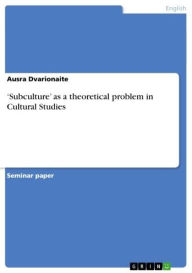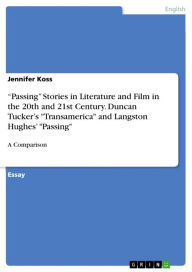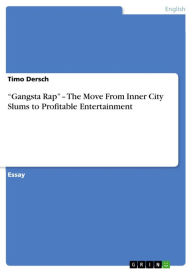'Subculture' as a theoretical problem in Cultural Studies
by Ausra Dvarionaite
2020-05-08 08:27:58
'Subculture' as a theoretical problem in Cultural Studies
by Ausra Dvarionaite
2020-05-08 08:27:58
Seminar paper from the year 2007 in the subject English Language and Literature Studies - Culture and Applied Geography, grade: 1,3, University of Rostock (Anglistik/Amerikanistik), course: HS: Popular Culture: Theory and Practice from c.1850 to c.19...
Read more
Seminar paper from the year 2007 in the subject English Language and Literature Studies - Culture and Applied Geography, grade: 1,3, University of Rostock (Anglistik/Amerikanistik), course: HS: Popular Culture: Theory and Practice from c.1850 to c.1950, 25 entries in the bibliography, language: English, abstract: Youth subcultures have always attracted a lot of attention, both from the media and from academics. It is not surprising because members of youth subcultures tend to be highly visible and often are responsible for moral panics. Secondly, youth cultures have been considered to be 'the product or epitome of social change, or a barometer of future changes'. That is why, in the twentieth century, in the time of social, economic and political changes, youth became an object of sociological, cultural, and psychological analyses. The concept of subculture has been an attractive model for explanation and analysis of youths' individual and collective behaviours in sociology for a diversity of theoretical positions. It is noticeable that every successive paradigm has tried to criticize or to show its dominance and authority over previous understandings. The term subculture was initially used in 1950's in the works of the Chicago School in the US to refer to the urban gangs. In British subcultural theory has begun with the studies of sociologists who sought to explain delinquent behaviour of young people and consistently relied on psychology and psychoanalysis. But the most influential body of work is New Subcultural Theory that was created during the 1970's by the researchers from the Centre for Contemporary Cultural Studies (CCCS) at Birmingham University. It has been strongly criticized but is still considered to be the ground work on subcultures. However, according to Rupa Huq, the term subculture has in many ways come of age. There are a lot of academics that criticize the writings of the CCCS and have developed postmodern theories on subcultures. They suggest new definitions and explanations of subcultures or even claim that the notion of subculture cannot be applied anymore to describe the culture of today's youth.
In this paper, I will introduce some different strands of the subculture theory about youth during the twentieth century. I will briefly introduce the theory of delinquency of American and British sociologists, and then I will give an overview of the Cultural Studies approach from the University of Birmingham in the 1970's and briefly indicate its weaknesses. Then I will introduce the approach of the contemporary subcultural theory and explain the concepts of clubculture, neo-tribe and lifestyle which are considered to be alternative to the concept of subculture.
Less













